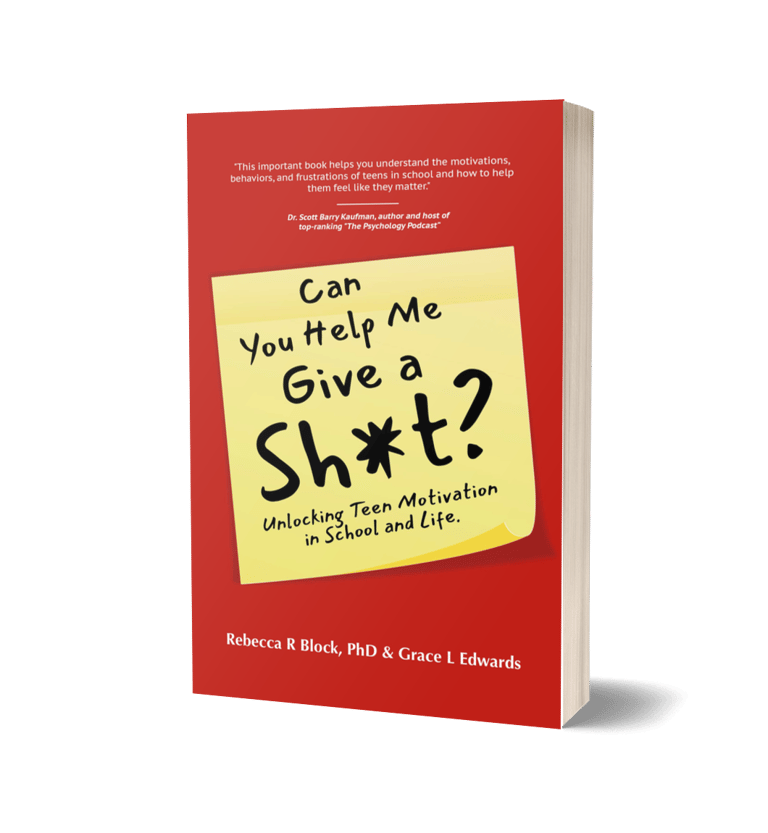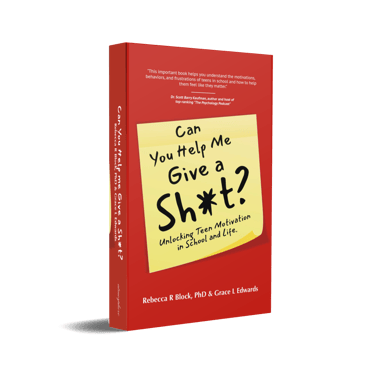

"This important book helps you understand... teens in school and how to help them feel like they matter."
- Scott Barry Kaufman, PhD, Cognitive scientist & author of Transcend
"A game-changer in education"
-Glenn Smith, Berkley Acheivement Scholarship Program at NYU
"A compelling read for educators, parents, and anyone invested in the future of education"
- BookView Review
"Essential reading for anyone committed to improving a teen's educational experience"
-Literary Titan
"Engaging and enlightening"
-Kirkus Reviews
"A rich and honest depiction of what teens are truly experiencing"
-Sarabeth Berk Bickerton, PhD, Keynote speaker & author of More Than My Title
Do you have a group interested in discussing this book? Contact Becca about joining you for a book talk, Q&A, or workshop.
Praise for Can You Help Me Give a Sh*t?
"We all want to feel like we're uniquely making some impact in the life that we're living. Unfortunately, we sometimes neglect this drive in teens. This important book helps you understand more about what's going on with the motivations, behaviors, and frustrations of teens in school and how to help them feel like they matter."
-Scott Barry Kaufman, PhD, Cognitive scientist, author of Transcend, and host of top-rated “The Psychology Podcast”
"Can You Help Me Give a Sh*t? provides a rare view into the experience of being a teen by letting us hear from students rather than just about them. We learn about the importance of being heard, seen, cared about, and understood through stories and interviews that illustrate how parents, teachers, and peers can affect teens' motivation and, ultimately, their safe passage into adulthood. As former head of People Development at Google, I see great value in helping young people develop the ability to understand and catalyze their own motivation. I have no doubt this will help them land and excel more smoothly in their careers."
-Karen May, PhD, Advisor/Coach and Former VP of People Development, Google
"How do we foster 'a desire to care' when teens don't see relevance in what they're being asked to do? Igniting teen motivation is a big issue for adult development, life and career success. Becca and Grace tackle this topic head on. This book is a rich and honest depiction of what teens are truly experiencing and why they don't give a shit. It honors their voices and stories, something that's sorely missing in other literature and reports. For me, the best takeaways are that we need to be co-pilots in supporting teens to find their own motivation instead of the drivers trying to motivate them. And, as parents and educators, we need to watch and listen to teens more and tell them what to do less. This will help them reach sustained motivation."
-Sarabeth Berk Bickerton, PhD, Keynote speaker and author of More Than My Title
“As an educator and an executive functioning coach for over 33 years, I work intensively with young people and their parents on a daily basis. Neurodivergent learners have their own set of challenges and obstacles. This must-read book makes it easy to empathize with so many teens and young adults who find it hard or impossible to stay motivated in school, and what parents and educators of all types can do to help them. I highly recommend it!”
-Jared Kallen, M.S. Ed, Founder and Director of Action Pact Coaching
"One of the most refreshing reads on an essential topic. The science of the what, why, and how are all present in fitting and digestible doses, but student voices are front and center. Listening deeply is the first step to tailoring effective solutions for any audience. This book demonstrates the practical and meaningful solutions that arise when researchers honor lived experience."
- Leah Mazzola, PhD, PCC, BCC, Founder/CEO & Director of Education, Youth Coaching Institute
"Can You Help Me Give a Sh*t? is a game-changer in education, pushing for a shift towards real engagement and connection in teaching. It underscores the importance of tailoring learning to students' interests and encouraging self-expression, making it a must-read amid the complexities of teen education. This book is a call to action for educators to create more personal and impactful learning experiences, offering a blueprint for student empowerment. As a higher education professional, I find it indispensable for anyone looking to genuinely meet students where they are and inspire profound growth."
-Glenn Smith, Assistant Director, Berkley Achievement Scholarship Program at NYU Stern School of Business.
"5 stars. Written in a captivating and accessible style, Can You Help Me Give a Sh*t? Unlocking Teen Motivation in School and Life is essential reading for anyone committed to improving a teen's educational experience"
"A compelling read for educators, parents, and anyone invested in the future of education, the book will inspire readers to rethink traditional educational practices and adopt a more student-centered approach. A must-read."
-BookView Review, awarded the Gold level Recommended reading badge


Becca has spent two decades researching and working with students in various roles – first as an academic tutor after finishing her undergraduate degree, then as a Graduate Teaching Assistant and eventually full Professor teaching writing classes to undergraduate students, and most recently as a researcher and designer in non-profits that work with K-12 schools. She’s also a co-founder of Phare, LLC, an organization that supports teens, parents, and high schools through coaching and training, and the parent of two lively sons.


Grace, a native born “Marylander,” is currently pursuing her undergraduate degree at the University of Pennsylvania in a Bachelor’s of Arts in Health and Societies, with a concentration in Race, Gender, and Health, and minoring in Journalism. After undergrad, she plans to pursue a career in the medical and healthcare field. She also hopes to continue story-telling through long-form content, writing about how people socialize, relate, and feel kinship with each other, despite their more obvious external differences. Ultimately, she is hoping to bridge these two interests in the practice of medicine and health.
About the authors
Socials
Workbook of activities to build lasting motivation just for newsletter subscribers




